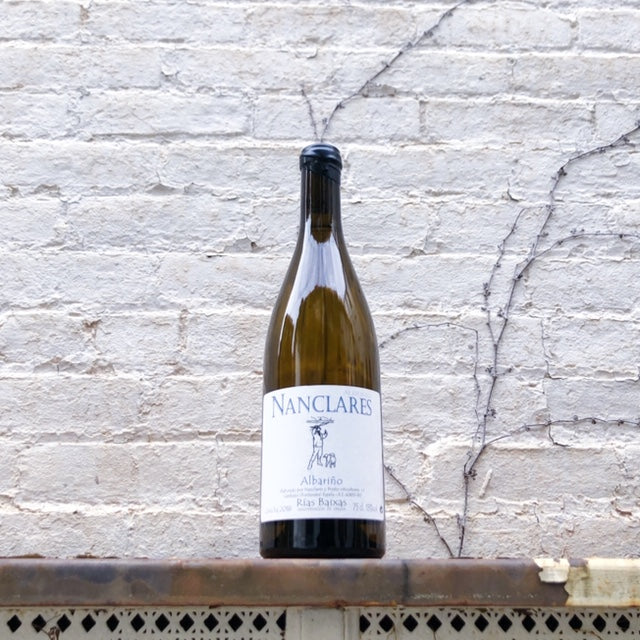
Alberto Nanclares - Albariño 2021
Regular price
$41.00
Sale
100% Albariño
Organic, Vegan
Rías Baixas, Galicia, Spain
From the importer-
Nanclares Albariño comes from 8 parcels in the parroquias (or parishes) of
Cambados and Ribadumia. After a hot spring and summer, grapes were hand-harvested beginning August 30th, pressed whole cluster into 90% steel vats and 10% used French oak barrels, and fermented with native yeast with malolactic fermentation suppressed in order to retain the naturally high acidity. The wine was raised on the lees for 9 months, bottled with modest levels of SO2, and was not clarified or filtered. An acid-driven, profound, and angular expression of Val do Salnés Albariño!
Alberto Nanclares is an unassuming new star in Cambados. From working as an economist for many years, to a fortuitous second career in grape-growing, to today crafting some of the most serious, ocean-infused, age-worthy single vineyard Albariños. Alberto is an ever-evolving colleteiro bringing Val do Salnés wines back to their Atlantic roots.
In 1992, Alberto and his wife wanted to unwind their careers near the ocean. They left their native Basque Country and settled in the seaside parroquia of Castrelo, just a few kilometers away from the most historic and traditional village for Albariño wines, Cambados. As happenstance, the small home they purchased came with some vineyard land. Initially, Alberto had no plans to make wine, but the idea of farming grew on him. He figured he had good terruño, so why not make his own wine. Alberto then invested in some wine-making tools and set-up a tiny winery in his garage.
In the beginning, Alberto farmed conventionally but quickly became disenchanted with the use of chemicals. Gradually, he moved away from the systematic herbicide and pesticide use, and has -now- eliminated chemicals altogether, with full-fledged organic farming and some work with biodynamics; organic production is very rare in this humid Atlantic-influenced region prone to viticultural difficulties. Alberto currently tends 2,5 hectares, all trained in the traditional Pergola style and divided into 12 small parcels in the parroquias of Castrelo (South Cambados), Vilariño (North Cambados) and Padrenda (North Meaño) where he focuses in "quality over quantity" by choosing to keep yields down to 4,000 to 7,000 Kg per hectare instead of the somehow abusive 12,000 Kg that the DO Rías Baixas permits. Alberto uses seaweed from the nearby ocean for compost and does not plow in order to keep the surrounding flora and fauna in their natural habitat.
After working with an enologist for several years, Alberto took over full time winemaking duties for his Nanclares wines in 2007. "In the winery, we respect the grapes as much as possible, we don't use any winemaking additions besides moderate amounts of SO2. We do not ferment with pie de cuba (pied-de-cuve) in order to preserve the identity of each vineyard." Alberto says. All of his wines are fermented with wild yeasts by parcel. Preferring the edginess of the naturally high in acidity Albariño grape, he eschews adding potassium to his wines, which is what many folks in Rías Baixas use to de-acidify and soften their wines. Malolactic fermentation rarely occurs, and the wines spend a good amount of time (usually more than one year) on their lees before being bottled without clarification or filtration.
Nanclares wines are angular and vin-de-garde in style, with great concentration and crystalline precision. He produces 5 different wines: Dandelion, a delicious village wine from multiple plots in and around Cambados. Next is the acid-driven, profound and classic Alberto Nanclares Albariño from thirty to sixty years old vines. Currently (we'll see some new single vineyard Cambados in the future) there are three vinos de parajes or single vineyard wines coming from Meaño: The serious and angular Soverribas from west facing vines planted on decomposed granite and clay soils (that's correct, clay!). The ocean-infused, multilayered and age-worthy Coccinela Cepas Vellas from a pie franco (own-rooted) centenarian vineyard. And lastly, the foot-trodden, skin-fermented Albariño called Crisopa Branco Tradicional; which the older locals in the village tell him this was the way Albariños used to taste in the past before modernization. For Alberto, Crisopa is a glimpse into ancient Albariño mythology.
